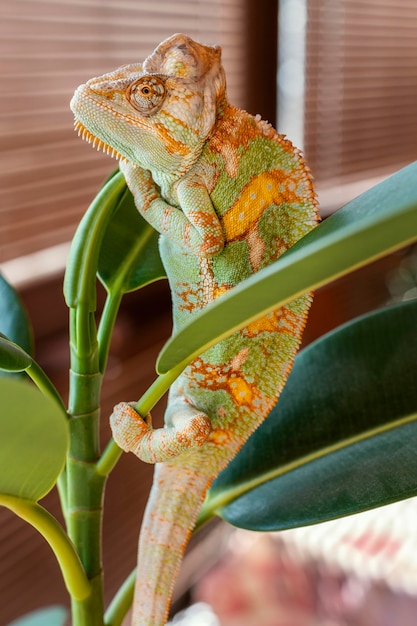Fascinating Facts about Iguanas

Iguanas are fascinating reptiles found in tropical regions.
Did you know that iguanas can grow up to 6 feet long?
Iguanas have a unique ability to change color, helping them blend into their surroundings.
Male iguanas are more vibrant in color compared to their female counterparts.
Despite their intimidating appearance, iguanas are generally docile creatures.
Iguanas have a long lifespan, with some species living over 20 years.
They are excellent climbers and can often be found basking in treetops.
Iguanas are herbivores, feeding mainly on plants and leaves.
In captivity, iguanas require a strict diet consisting of specific greens and vegetables.
Iguanas have a spiky dewlap, which they use for territorial displays and courtship rituals.
Iguanas are cold-blooded animals, relying on external sources such as the sun to regulate their body temperature.
Did you know that iguanas can regenerate their tails if they lose them in a predator attack?
Some iguana species, such as the marine iguana, are capable of swimming in the ocean.
Iguanas have excellent vision and can detect movement from quite a distance.
Despite their tough exterior, iguanas have a delicate sense of hearing.
Iguanas are known for their impressive ability to camouflage and remain hidden from predators.
Female iguanas lay eggs in burrows, which hatch after approximately two months.
Iguanas are territorial animals and mark their territory with scent glands located in their cloacas.
Fascinating Facts about Iguanas part 2
Contrary to popular belief, iguanas cannot change their gender from male to female or vice versa.
In ancient civilizations, iguanas were considered sacred animals and symbolized wisdom and transformation.
Iguanas have a parietal eye on top of their head, which helps them detect predators from above.
Iguanas are excellent swimmers and can use their powerful tails to navigate through water.
Some iguanas have a gentle disposition and can become beloved pets.
Iguanas are prone to metabolic bone disease if not provided with proper UVB lighting and calcium supplements.
The largest species of iguana is the green iguana, which can weigh up to 20 pounds.
Iguanas shed their skin regularly to accommodate for growth and to remove parasites.
Iguanas have a third eye called the parietal eye, which helps them detect shadows and changes in light.
The Galapagos marine iguana is the only lizard in the world adapted for living both on land and in the ocean.
Iguanas are known for their strong jaws and sharp teeth, which they use for defense against predators.
In some cultures, iguana meat is considered a delicacy and is used in traditional dishes.
Iguanas play a vital role in their ecosystems by dispersing seeds through their feces.
Iguanas have a specialized organ called the Jacobsen’s organ, which helps them detect pheromones.
Iguanas have a prehensile tail that they can use as an extra limb, aiding in climbing and balance.
Green iguanas are often seen basking in the sun to absorb heat and necessary UV radiation.
Iguanas have sharp claws, which they use for climbing trees and grasping onto surfaces.
Some iguana species can hold their breath for an extended period, allowing them to stay underwater longer.
The spines along an iguana’s back act as a defense mechanism, making it difficult for predators to swallow them.
Iguanas are known for their distinctively long and sticky tongues, which they use to capture food.
Iguanas exhibit unique courtship rituals, including head-bobbing and body displays.
The black spiny-tailed iguana is known for its ability to run on its hind legs, similar to a miniature dinosaur.
Iguanas are ectothermic, meaning they rely on their environment to regulate their body temperature.
Iguanas have keen senses of smell, which they use to locate food sources and potential mates.
The crests on an iguana’s head act as a radiator, helping to dissipate heat from their bodies.
Some iguana species hibernate during colder months to conserve energy.
Iguanas have become popular pets, although they require specialized care and a large enclosure to thrive.

